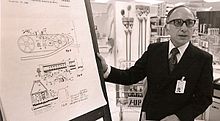ನಾರ್ಮನ್ ಜೋಸೆಫ್ ವುಡ್ಲ್ಯಾಂಡ್
ನಾರ್ಮನ್ ಜೋಸೆಫ್ ವುಡ್ಲ್ಯಾಂಡ್ | |
|---|---|
 | |
| Born | ೬ ಸೆಪ್ಟೆಂಬರ್ ೧೯೨೧ |
| Died | December 9, 2012 (aged 91) |
| Alma mater | ಡ್ರೆಕ್ಸೆಲ್ ಯುನಿವರ್ಸಿಟಿ |
| Known for | ಬಾರ್ಕೋಡ್ನ ಸಹ ಅನ್ವೇಷಕ |
ನಾರ್ಮನ್ ಜೋಸೆಫ್ ವುಡ್ಲ್ಯಾಂಡ್ (ಎನ್. ಜೋಸೆಫ್ ವುಡ್ಲ್ಯಾಂಡ್ ಮತ್ತು ಎನ್.ಜೆ. ವುಡ್ಲ್ಯಾಂಡ್ ಎಂದೂ ಕರೆಯಲ್ಪಡುತ್ತಿದ್ದರು; ಸೆಪ್ಟೆಂಬರ್ ೬, ೧೯೨೧ – ಡಿಸೆಂಬರ್ ೯, ೨೦೧೨) ಬಾರ್ಕೋಡ್ ಅನ್ವೇಷಕರೊಬ್ಬರೆಂದು ಪ್ರಖ್ಯಾತರು,ಈ ಅನ್ವೇಷಣೆಗೆ ಇವರು US Patent 2,612,994 ಅನ್ನು ಅಕ್ಟೋಬರ್ ೧೯೫೨ರಲ್ಲಿ ಪಡೆದರು.[೧][೨]
ಜೀವನ
[ಬದಲಾಯಿಸಿ]Woodland was born in Atlantic City, New Jersey on September 6, 1921 to Jewish parents, the elder of two boys.[೧]
After graduating from Atlantic City High School, Woodland went on to earn his Bachelor of Science in Mechanical Engineering (BSME) from Drexel University (then called Drexel Institute of Technology) in 1947.[೩] During his military service in World War II, Woodland worked as a technical assistant with the Manhattan Project in Oak Ridge, Tennessee. From 1948-1949, he worked as a lecturer in mechanical engineering at Drexel.
ಬಾರ್ಕೋಡ್
[ಬದಲಾಯಿಸಿ]ಈ article'ದ ದನಿ ಅಥವಾ ಶೈಲಿ ವಿಕಿಪೀಡಿಯದಲ್ಲಿ ಬಳಸುವ ವಿಶ್ವಕೋಶಕ್ಕೆ ತಕ್ಕಂತೆ ಇಲ್ಲ. (December 2007) |
In 1948, Bernard Silver, a fellow Drexel Institute of Technology grad student with Woodland, overheard a supermarket executive asking the dean of students to figure out how to capture product information automatically at checkout. The dean turned down the request, but Silver went on to mention the problem to Woodland. After working on some preliminary ideas, Woodland was persuaded that they could create a viable product.
Woodland took some stock market earnings, quit his teaching job and moved to his grandfather's Florida apartment. While at the beach, Woodland again considered the problem, recalling how with Morse code dots and dashes are used to send information electronically, he started to draw dots and dashes in the sand similar to the shapes used in Morse code. After pulling them downward with his fingers, producing thin lines resulting from the dots and thick lines from the dashes, he came up with the concept of a two-dimensional, linear Morse code, and after sharing it with Silver and adapting movie soundtrack technology, they applied for a patent on October 20, 1949, receiving U.S. Patent 2,612,994 ("Classifying Apparatus and Method") on October 7, 1952, covering both linear and circular bullseye printing designs.
Woodland was employed by IBM in 1951, and although Woodland and Silver wanted IBM to develop the technology, it wasn't commercially feasible, so they sold the patent to Philco in 1952 for $15,000, which sold it to RCA later in 1952. RCA went on to attempt to develop commercial applications through the 1960s until the patent expired in 1969.
After RCA interested the National Association of Food Chains in 1969 in the idea, and they formed the U.S. Supermarket Ad Hoc Committee on a Uniform Grocery Product Code, rival IBM became involved in 1971, finding out about Woodland's work and transferring him to their North Carolina facilities, where he played a key role in developing the most important version of the technology, the Universal Product Code (UPC), beating RCA in a competition.
The first item scanned was a packet of chewing gum in an Ohio supermarket in 1974.
ನಿಧನ
[ಬದಲಾಯಿಸಿ]ವುಡ್ಲ್ಯಾಂಡ್ ಡಿಸೆಂಬರ್ ೯, ೨೦೧೨ ರಂದು, ಎಡ್ಜ್ವಾಟರ್, ನ್ಯೂ ಜರ್ಸಿಯಲ್ಲಿ ನಿಧನರಾದರು.[೧][೪]
ಪ್ರಶಸ್ತಿಗಳು
[ಬದಲಾಯಿಸಿ]- In 1973 IBM presented Woodland with their Outstanding Contribution Award.[೩]
- In 1992 he was awarded the National Medal of Technology from President George H. W. Bush for his contribution to barcode technology.[೫]
- In 1998 Woodland received an honorary degree from his alma mater, Drexel University.[೩]
- In 2011 Woodland was inducted into the National Inventors Hall of Fame.[೬]
ಬಾಹ್ಯಕೊಂಡಿಗಳು
[ಬದಲಾಯಿಸಿ]- ↑ ೧.೦ ೧.೧ ೧.೨ Margalit Fox (December 12, 2012). "N. Joseph Woodland, Inventor of the Bar Code, Dies at 91". New York Times. Retrieved 2012-12-13.
N. Joseph Woodland, who six decades ago drew a set of lines in the sand and in the process conceived the modern bar code, died on Sunday at his home in Edgewater, N.J. He was 91. ... Norman Joseph Woodland was born in Atlantic City on Sept. 6, 1921. ...
{{cite news}}: Cite has empty unknown parameter:|coauthors=(help) - ↑ ಯು.ಎಸ್ ಪೇಟೆಂಟ್ ೨೬,೧೨,೯೯೪
- ↑ ೩.೦ ೩.೧ ೩.೨ "Dr. Joseph Woodland '47 (MEM), Hon. '98 Alumni". Drexel University. Retrieved 2007-06-29.
- ↑ Former Raleigh resident, co-creator of bar code, dies at age 91. Archived 2013-10-24 ವೇಬ್ಯಾಕ್ ಮೆಷಿನ್ ನಲ್ಲಿ. In: newsobserver.com
- ↑ "The National Medal of Technology Recipients"
- ↑ "Inventor Profile: N. Joseph Woodland". National Inventors Hall of Fame. 2011. Retrieved 2012-12-13.
| ಈ ಲೇಖನ ಅಮೇರಿಕಾ ಸಂಸ್ಥಾನದ ಇಂಜಿನಿಯರ್, ಅನ್ವೇಷಕ ಅಥವಾ ಔದ್ಯಮಿಕ ವಿನ್ಯಾಸಕಾರನ ಬಗ್ಗೆ ಒಂದು ಚುಟುಕು. ನೀವು ಇದನ್ನು ವಿಸ್ತರಿಸುವುದರ ಮೂಲಕ ವಿಕಿಪೀಡಿಯಾಗೆ ಸಹಾಯ ಮಾಡಬಹುದು. |
- Pages using the JsonConfig extension
- CS1 errors: empty unknown parameters
- ವೆಬ್ ಆರ್ಕೈವ್ ಟೆಂಪ್ಲೇಟಿನ ವೇಬ್ಯಾಕ್ ಕೊಂಡಿಗಳು
- Articles with hCards
- ಬರೆಹದ ಶೈಲಿಯನ್ನು ಬದಲಿಸಬೇಕಾದ ಅವಶ್ಯಕತೆ ಈ ವಿಕಿಪೀಡಿಯ ಲೇಖನಕ್ಕಿದೆ from December 2007
- ಬರೆಹದ ಶೈಲಿಯನ್ನು ಬದಲಿಸಬೇಕಾದ ಎಲ್ಲ ಲೇಖನಗಳು
- 1921 ಹುಟ್ಟುಗಳು
- 2012 ಸಾವುಗಳು
- ಅಮೇರಿಕಾದ ಅನ್ವೇಷಕರು
- ಡ್ರೆಕ್ಸೆಲ್ ಯುನಿವರ್ಸಿಟಿ ಹಳೆಯ ವಿದ್ಯಾರ್ಥಿ
- ಡ್ರೆಕ್ಸೆಲ್ ಯುನಿವರ್ಸಿಟಿ ಅಧ್ಯಾಪಕರು
- ಐಬಿಎಂ ನೌಕರರು
- ಮ್ಯಾನ್ಹಟನ್ ಯೋಜನೆಯ ಜನರು
- National Inventors Hall of Fame inductees
- National Medal of Technology recipients
- ಅಟ್ಲಾಂಟಿಕ್ ಸಿಟಿ, ನ್ಯೂ ಜರ್ಸಿಯ ನಿವಾಸಿ
- ಎಡ್ಜ್ವಾಟರ್, ನ್ಯೂಜರ್ಸಿನಿವಾಸಿ
- ಅಮೇರಿಕಾದ ಇಂಜಿನಿಯರ್ ಬಗ್ಗೆ ಚುಟುಕುಗಳು
